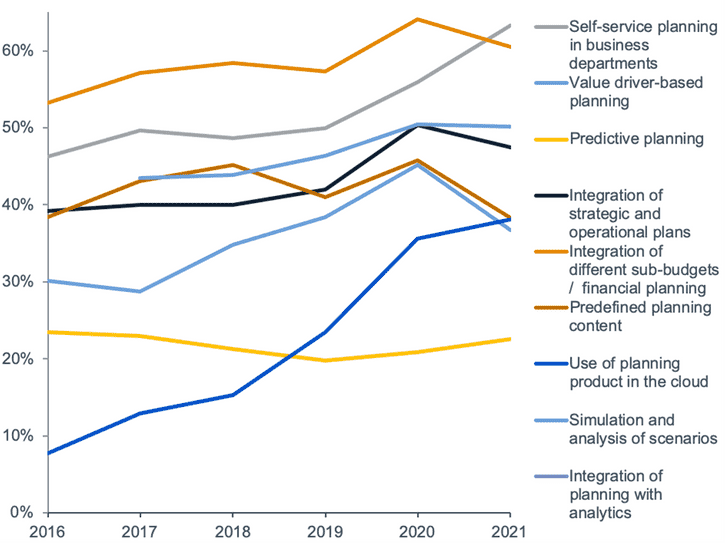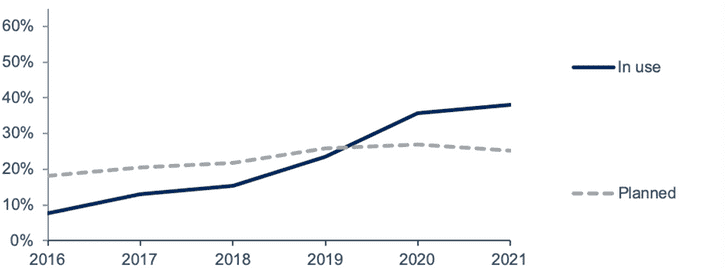Increase in Self-Service Planning in Business Departments: A Sign of the Times
The Planning Survey 21 by BARC is published
The analyst firm BARC published the results of The Planning Survey 21 today. The seventh edition of BARC’s respected annual study collates feedback from over 1,400 professionals on market trends and their use of software for planning, budgeting and forecasting.
Self-service planning is the new #1 trend
Self-service planning in business departments has surged in popularity over the last two years to become the number one trend in planning software this year (see Figure 1), adopted by 63% of companies.

“The rise of self-service appears to be largely due to the pandemic,” said Christian Fuchs, senior analyst at BARC and author of The Planning Survey 21.
“Increased market dynamics have led many decision-makers to demand forecasts and projections at least once a month to take account of changing signals from their environment for corporate management. To increase the speed and agility of planning and forecasting, it must take place directly in business departments. Therefore, the software tools used need to be straightforward and business-user-friendly.”
Cloud planning continues strong growth
The use of cloud-based planning has jumped from just 8% of survey respondents in 2016 to 38% in 2021 (see Figure 2). The last three years have seen especially strong growth.
“The introduction or modernization of software solutions is a necessary investment for companies seeking to optimize their planning and forecasting. Many of the best solutions on the market today either have a cloud version or are exclusively cloud-based so a large proportion of new implementations use the cloud,” said Fuchs. “Particularly in dynamic times, cloud-based solutions can provide fast time to value by eliminating time-consuming installation processes. Right now, nothing is more important than up-to-date information for decision-makers.”

Simulation and scenario analyses
50% of survey respondents currently use simulations and scenario analyses and a further 40% plan to do so. Simulations allow the analysis of different scenarios, based on mathematical business models and variable parameters. The detailed comparison of different scenarios helps to evaluate the influence of changes as well as the resilience of companies and thus provides important insights for corporate management.
“The fact that nine in ten companies either use or plan to leverage simulations and scenario analysis in the future demonstrates their importance,” said Fuchs. “Increasing dynamics and uncertainty are major reasons for this. We see many organizations now regularly using simulations to better estimate the impact of important decisions.”
About The Survey
The Planning Survey 21 is the seventh edition of BARC’s major annual study into the selection and use of planning, budgeting and forecasting tools. The findings are based on a worldwide survey of 1,422 planning users, consultants and vendors, which was conducted from November 2020 to February 2021. It features analysis and comparison of 21 leading planning products based on user feedback, as well as current data on market trends and the selection and use of software. As in previous years, BARC pledged to give €1 to charity for every survey completion. This year, a donation of €1,500 was made to UNICEF.
For more information, visit: https://bi-survey.com/planning-survey-about
For aggregated product-related results and an online product comparison tool, visit: https://bi-survey.com/planning-software-comparison
